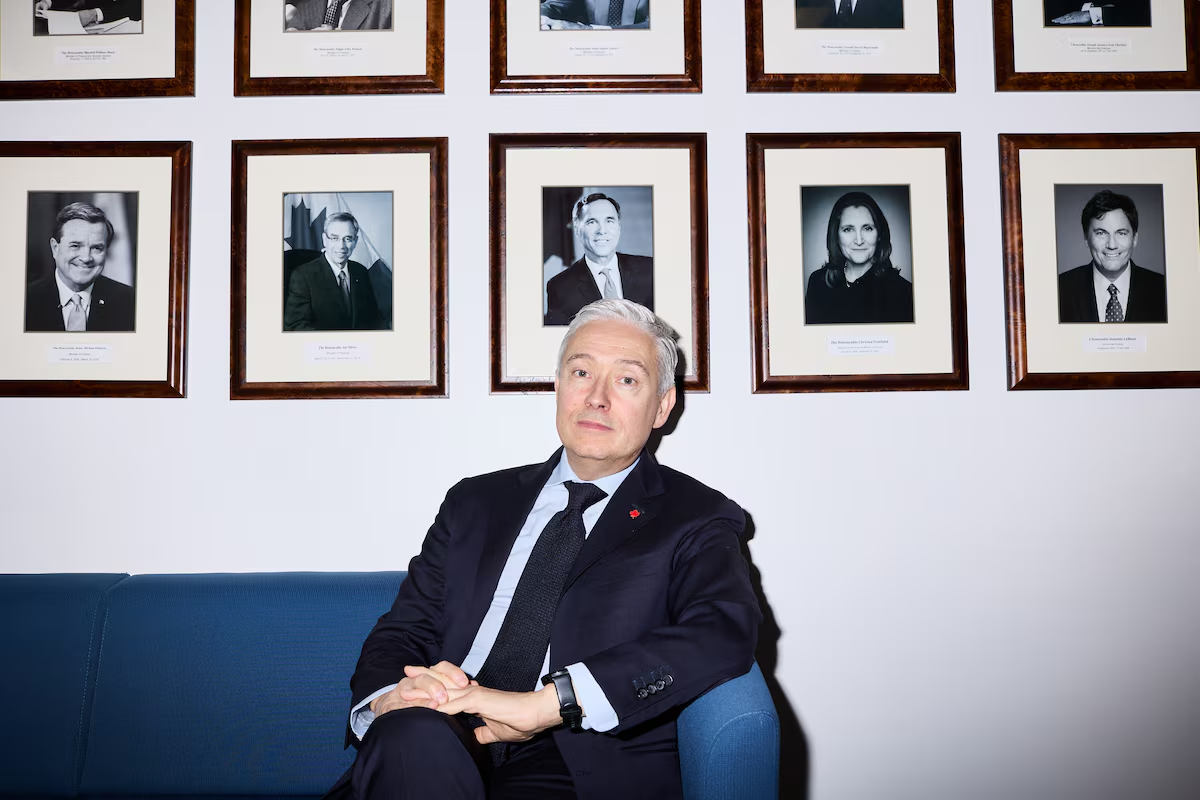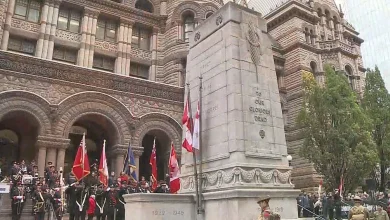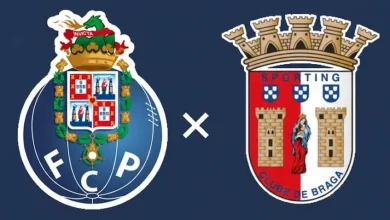Man of the moment: François-Philippe Champagne prepares for make-or-break budget

At a dinner held in honour of Jean Chrétien in his hometown of Shawinigan, Que., last month, Finance Minister François-Philippe Champagne paid homage to the man he called his “model, mentor and friend” and “one of the most profitable investments” the former industrial and forestry hub of 50,000 has ever made.
The former prime minister – who, at 91, never misses a beat – was quick to return the compliment from Shawinigan’s second-most favourite son, telling Radio-Canada: “Who would have said that two MPs from Saint-Maurice would become finance minister?”
Indeed, the riding now called Saint-Maurice-Champlain is among only a handful in Canada that has produced more than one finance minister. The sprawling Quebec district was represented by Mr. Chrétien, when, in 1977, he became the 27th person – and the first francophone – to lead the Department of Finance. In March, Mr. Champagne, the riding’s Liberal MP since 2015, became the country’s 42nd Minister of Finance.
Open this photo in gallery:
Then-finance-minister Jean Chrétien, left, holds a press conference with former finance minister John Turner, in November, 1977.Tibor Kolley/The Globe and Mail
The obvious question hanging in the mid-October air that night in Shawinigan was whether Saint-Maurice might one day also produce a second prime minister in Mr. Champagne. It’s an open secret in his riding – not to mention to Ottawa – that the 55-year-old politician nicknamed “the Energizer Bunny” by colleagues would like the top job some day. He was considered a contender to succeed Justin Trudeau until a certain former Bank of Canada governor entered politics in January and ran away with the prize – if you want to call it that, given the existential angst Donald Trump’s return to the White House has since been causing the United States’s northern neighbour and erstwhile best friend.
For now, Mr. Champagne has had to settle for the eternally thankless and excruciatingly difficult job of being Canada’s Finance Minister at what his own boss describes at a time when “our former strengths, based on close ties to America, have become our vulnerabilities.”
Prime Minister Mark Carney and Mr. Champagne are both billing the fiscal plan the government will unveil in its Nov. 4 federal budget as a “generational” shift aimed at forcing a fundamental retooling of the Canadian economy, with massive investments in nation-building projects to diversify trade, all without destroying the balance sheet.
For Mr. Champagne, it will also be the biggest test of his political career, one that could determine whether he can survive in his current job, much less aspire to one day reach the top.
“This is not just any other budget. It’s a budget of consequence. It is not a moment for trends; this is a moment for decisiveness and implementation of an agenda that not only should be bold, but which makes difficult choices for the country,” says Business Council of Canada chief executive officer Goldy Hyder. “Minister Champagne is trying to cast himself as the man of the moment. The question is: Is he?”
The Finance Minister – a preternaturally optimistic, glass-half-full kind of person – appears undaunted by the challenge. Unlike Mr. Carney, who has a reputation for being something of a prickly taskmaster and tough-to-please boss, the Finance Minister radiates the can-do energy of a motivational speaker. People who work for him seem to light up in his presence.
Ensconced in a cerulean armchair in his 17th-floor office in Ottawa’s James Michael Flaherty Building, with the Gatineau Hills ablaze in late October reds and golds as his backdrop, Mr. Champagne recalls his mentor’s words when he became finance minister 48 years ago.
Open this photo in gallery:
Mr. Champagne, a Liberal MP since 2015, became the country’s 42nd Minister of Finance in March.Rémi Thériault/The Globe and Mail
“Mr. Chrétien said he accepted the job ‘with humility, but also with confidence.’ I feel exactly the same way,” Mr. Champagne insists. “Maybe it’s my upbringing. Maybe it’s my time [working] in Europe, my time in business. But I really meant what I said when I said we’re going to do a generational pivot and generational investments. We need to chart a new course.”
Talk about creating great expectations. Fulfilling them will be another matter altogether.
Mr. Champagne is hardly the first finance minister to manage the country’s accounts during a time of deep economic uncertainty. When Mr. Chrétien inherited the job in 1977, Canada was reeling from sky-high inflation, unemployment and interest rates. The dollar was in a free-fall, owing to a chronic balance of payments deficit.
Wage and price controls, introduced by Pierre Trudeau’s government in 1975, had angered the labour movement. Most Canadians could not keep up with rapidly rising prices, and the economy could not absorb the onslaught of baby boomers entering the labour market. Stagflation dug in its heels. So did the country’s gloomy mood.
During his 20-month tenure at Finance, Mr. Chrétien proved unable to slay the deficit. He would make up for it a decade and a half later, when, as prime minister, he and his finance minister, Paul Martin, confronted the country’s then looming debt crisis by taking a chainsaw to federal spending and returning the budget to surplus for the first time in more than two decades.
Now, however, it feels like déjà vu all over again.
Jean Chrétien speaks in the House of Commons in 1995. When Mr. Chrétien was appointed the first francophone to lead the Department of Finance in 1977, the Canadian economy was plagued with sky-high inflation, unemployment and interest rates.
Tom Hanson/The Canadian Press
Almost 50 years after Mr. Chrétien’s tenure as finance minister, Mr. Champagne has also stepped into the role during a time of deep economic uncertainty.
Blair Gable/Reuters
Chronic deficits are once again the norm in Ottawa. Since 2007, the federal debt has nearly doubled to almost $1.3-trillion. The ratio of federal net debt to gross domestic product has eased since the COVID-19 pandemic, to about 42 per cent from 47 per cent. But it remains more than 10 percentage points higher than it was in 2019. There are growing concerns about the ratio creeping up again to levels that could rattle financial markets if Mr. Champagne is unable to cut program spending fast enough to offset the gargantuan increases in defence and capital spending that the Carney government is promising.
“It is not an easy job at any time to be the minister of finance of any country. Mr. Champagne will have a difficult task,” Mr. Chrétien confides over the phone. “He has political experience – which is very important in politics. He has had experience in cabinet for nine years, so he is well-equipped. But it is going to be tough.”
Justin Trudeau’s government repeatedly set fiscal guardrails, only to blow through them with alacrity. In her 2023 fall economic statement, then-finance-minister Chrystia Freeland vowed to limit the deficit-to-GDP ratio to 1 per cent or less, starting in 2026. But that pledge went out the window with Mr. Trump’s return to office and Mr. Carney’s vow to increase military spending to 5 per cent of GDP by 2035. The deficit-to-GDP ratio is expected to be above 2 per cent in the current fiscal year. All bets are off as to what exactly Mr. Champagne has up his sleeve to put the ratio on a downward slope, as he has promised to do.
His credibility is on the line. In a prebudget letter sent to Mr. Carney, the Business Council of Canada called for the budget to lay down “clear fiscal anchors” aimed at gradually reducing the net-debt-to-GDP ratio and interest payments as a percentage of revenues. The business group, which represents more than 170 large domestic and foreign-owned corporations, also urged that the government commit to slashing this year’s overall deficit – which analysts estimate could be as high as $100-billion – in half by 2028.
Mr. Champagne is eager to temper concerns about excessive debt accumulation. “Canada has the fiscal capacity to do this generational shift,” he maintains, pointing to recent comments from International Monetary Fund head Kristalina Georgieva praising this country’s balance sheet, along with Germany’s, as the strongest in the Group of Seven countries. “At the same time, we need fiscal discipline. That is what Canadians will see in this budget.”
When talking about Canada’s current economic challenges, the analogy Mr. Champagne most likes to draw is not with the 1970s, but with the pivot that C.D. Howe oversaw during the postwar period beginning in 1945. Howe had directed Canada’s wartime economy as minister of munitions and supply in Mackenzie King’s Liberal government, commandeering privately-owned factories to produce to military equipment. After the war, as minister of reconstruction, Howe led efforts to restart civilian production by selling off factories, mostly to American owners, and undertaking major infrastructure projects to facilitate the development of a modern trading economy.
Open this photo in gallery:
With the coming federal budget, which will be tabled on Nov. 4, Mr. Carney, left, and Mr. Champagne will likely face jurisdictional battles as they seek to build the ‘one Canadian economy.’Carlos Osorio/Reuters
“That’s my bible,” Mr. Champagne declares, holding up a copy of a 1979 biography of Howe by historians Robert Bothwell and William Kilbourn. “When you know your past, you can better chart your future. We have faced challenges as a nation, but we have seized the moment. We are that kind of people. When faced with adversity, we find our way.”
Just as nothing about Howe’s mission was easy, Mr. Champagne and Mr. Carney will inevitably encounter obstacles. Howe’s grand plan for the economy ran up against opposition from provincial governments eager to regain control over policy after ceding it to Ottawa during the war. Mr. Champagne and Mr. Carney will likely face jurisdictional battles of their own as they seek to build the “one Canadian economy” they talk about.
“Mr. Champagne is right about one thing and that is the magnitude of the problem,” says Prof. Bothwell, now an emeritus professor at the University of Toronto. “We are faced with the crippling of the assumptions that have guided our policy since the 1960s.”
The inheritor of Howe’s mantle grew up in francophone Quebec under very different circumstances than those of the U.S.-born Massachusetts Institute of Technology engineering graduate who presided over Canada’s postwar economic transformation.
Mr. Champagne’s parents divorced when he was still in diapers. While his father remarried, and had two more children with his second wife, Mr. Champagne lived separately from them with his civil-servant mother in an apartment in the Quebec City suburb of Sainte-Foy, spending weekends with his dad in Shawinigan. His father was a prominent entrepreneur in Mr. Chrétien’s hometown, where he owned a water treatment company. Mr. Champagne attributes his gregarious nature to the need to find playmates at the park near his mother’s place, where he spent lonely hours as a child. “I didn’t have any brothers or sisters [at home] and I needed to make friends,” he recalls. “So, I had to be outgoing.”
He attended cégep, as postsecondary college in Quebec is known, in Trois-Rivières, before going on to study law at the University of Montreal. In his final year, he noticed a poster for a graduate law program for foreign students at Cleveland-based Case Western Reserve University. He applied, mostly on a whim, and was stunned to receive an acceptance letter, given his “average grades.” Years later, he would learn that he was the only Canadian to apply.
“I was instantly charmed, as every American and every other student from every other country was,” Lewis Katz, founder of the Case Western program, says of his reaction on meeting his first Québécois student in 1993. “He also had smarts. He could deal with problems – business problems. He was always two steps ahead.”
Open this photo in gallery:
Mr. Champagne formally entered federal politics in 2015 when he was elected the Liberal MP for the Quebec riding of Saint-Maurice-Champlain.Rémi Thériault/The Globe and Mail
After graduating, Mr. Champagne landed a job at Bailey Controls, a local manufacturer of industrial automation systems that had been bought by Italy’s Elsag SpA. He remembers living in the Cleveland suburb of Wickliffe and “earning less than my rent.” Luckily, he was soon offered a better-paying job at Bailey’s Italian parent.
At 24, in 1994, Mr. Champagne found himself on his own in Genoa. He learned Italian, mostly on the street. Elsag was taken over by ABB Group in 1998. A year later, Mr. Champagne went to work at the Swedish-Swiss engineering giant’s Zurich headquarters. With the move came a culture shock: “Everything in Italy was grey; everything in Switzerland was black and white.”
In 2008, Mr. Champagne moved to London to become the director of strategic development at Amec PLC, an engineering and project management consultancy. By then, he had built a network of business contacts across Europe, helping him land him on the World Economic Forum’s 2009 roster of young global leaders. The distinction earned him a slew of media coverage in Quebec, and a profile in the business pages of The Globe and Mail. It also paved the way for his next move.
Saint-Maurice-Champlain, which had been a Liberal stronghold under Mr. Chrétien, had fallen to the Bloc Québécois in 2004, and then to the New Democratic Party in the Orange Wave of 2011. The riding’s NDP MP, Lise St-Denis, later crossed the floor to the Liberals. But that did not stop Mr. Champagne from setting his sights on the party’s nomination. He moved back to Shawinigan in 2013 and immediately began campaigning for Ms. St-Denis’s job.
“I met François-Philippe when he was a kid and when he decided to try politics, he came to consult me,” Mr. Chrétien recalls. “He took my advice and spent a year and a half in the riding, meeting people, going to hockey matches, going to golf tournaments and going into the taverns. His did his job, because in politics you work for the people.”
Mr. Champagne won the nomination by acclamation, after Ms. St-Denis bowed out. In the 2015 election, he won 41.5 per cent of the vote, doubling the scores of his NDP and Bloc rivals.
Mr. Champagne served a year as parliamentary secretary to then-finance-minister Bill Morneau and he quickly earned a reputation as a hard worker who was always willing to perform the less glamorous tasks that most cabinet understudies would rather avoid, such as filling in for the minister on the rubber-chicken circuit. Mr. Trudeau appointed him to cabinet as trade minister in early 2017, though he left the critical Canada-U.S. trade file in Ms. Freeland’s hands, as she renegotiated the North American free-trade agreement with the first Trump White House.
Mr. Champagne was tasked with completing talks with other members of the Trans-Pacific Partnership which were aimed at saving the trade deal after Mr. Trump withdrew the U.S. from the TPP during his first term. The personable Mr. Champagne was also charged with negotiating a free-trade deal with China, a half-baked idea that exploded in the Trudeau government’s face after the RCMP arrested Huawei executive Meng Wanzhou at Vancouver International Airport on a U.S. extradition warrant in 2018.
Mr. Trudeau promoted Mr. Champagne to the foreign affairs portfolio after the 2019 election, hoping to leverage his networking skills to raise Canada’s global profile. In the end, his stint at Global Affairs proved frustrating for Mr. Champagne, who was forced to defend Ottawa’s foot-dragging on a decision to ban Huawei from participating in Canadian 5G networks, and embarrassing for the Trudeau government after The Globe revealed that Mr. Champagne held mortgages from the Bank of China on two London properties. Mr. Champagne promptly refinanced the mortgages with a Canadian bank, but it was not until 2022 that Ottawa finally imposed a ban on Huawei, long after its Five Eyes partner countries had done so.
In early 2021, Mr. Champagne moved to the job he seemed to have been made for when Mr. Trudeau appointed him minister of innovation, science and industry. There, he was in his element hustling deals to snag electric-vehicle and battery manufacturing plants aimed at breathing new life into the country’s shrinking automotive sector.
Former prime minister Justin Trudeau appointed Mr. Champagne minister of innovation, science and industry in 2021, a role he held until he took up the finance minister position in March, 2025.
Open this photo in gallery:
Mr. Champagne delivers remarks during the unveiling of the Arrow electric vehicle at the 2023 Toronto International Auto Show. During his time as innovation minister, Mr. Champagne worked to secure EV and battery manufacturing deals aimed at reviving Canada’s shrinking automotive sector.Christopher Katsarov/The Globe and Mail
Mr. Champagne still regales in telling the story of how he persuaded Volkswagen to build a $7-billion gigafactory in St. Thomas, Ont., starting with an early 2022 cold call to the CEO of the company’s North American division that culminated a year later in the announcement that Ottawa and Queen’s Park would provide up to $13-billion over 10 years to subsidize battery production at a sprawling 850,000-square-foot plant in the province’s southwest.
If the deal with VW appears on solid ground, for now at least, the same cannot be said for many of the others Mr. Champagne inked to lure EV and battery makers here. EV uptake has stalled in North America and prospects for the sector have dimmed dramatically since the U.S. Congress eliminated a US$7,500 rebate for battery-powered cars in September.
Mr. Champagne remains sanguine that Canada’s EV strategy will eventually pay off.
“When you’ve been doing the same thing for 100 years and you decide to move to a different technology, you always have issues with respect to the adoption of that technology and market demand,” he offers. “Henry Ford was not an immediate success. Telsa took 17 years to break even. I still think we are moving toward electrification, but the timeline has shifted.”
Suffice it to say, no one in Mr. Trudeau’s cabinet was chomping at the bit to replace Chrystia Freeland after her bombshell resignation as finance minister last December. Mr. Champagne is coy about whether he explicitly turned down the position. The job briefly went to Dominic Leblanc until Mr. Carney took over in March and named Mr. Champagne as his Finance Minister.
Some observers had expected Mr. Carney to appoint Tim Hodgson to the finance portfolio after the April election. The two men had been colleagues at Goldman Sachs. Mr. Hodgson became a special adviser to Mr. Carney when he ran the Bank of Canada.
Instead, Mr. Hodgson went to Natural Resources and Mr. Champagne held on to Finance, making him the fulcrum of the economic pivot the Carney government is now seeking to undertake.
Open this photo in gallery:
Mr. Champagne attends the swearing-in ceremony at Rideau Hall on March 14, marking the beginning of his tenure as Finance Minister.Blair Gable/Reuters
The jury is out on whether Mr. Champagne can succeed in his current job without sabotaging his political future. Ms. Freeland’s experience underscored the potential hazards of the finance portfolio for politicians with aspirations of higher office. The “comprehensive expenditure review” Mr. Champagne announced in July, and which aims to cut program spending by 15 per cent by 2028-29, will mean making unpopular decisions about which programs survive – and which ones do not.
“He is a natural marketer; he is natural networker. This is not that role,” the Business Council’s Mr. Hyder says of the finance job. “I would prefer that no finance minister be popular with his colleagues. That would mean he has the capacity to say no.”
Mr. Champagne got off to a bumpy start as Finance Minister when, in May, he said he did not plan to table a budget in 2025. His comments drew outrage from the opposition and criticism on Bay Street. Mr. Champagne was publicly contradicted by Mr. Carney, who soon announced that the government would propose a fall budget after all. Since then, the two men have been nearly perfectly in sync – in public, at least.
In Mr. Champagne’s telling, it’s the same way behind closed doors.
“Prime Minister Carney and I come from a similar place, [with] a similar vision and level of ambition for the country,” he insists. “I think we are the right team at the right moment.”
Still, unlike Justin Trudeau, for whom economic policy often appeared to be a distraction, Mr. Champagne faces in Mr. Carney a boss with impeccable financial credentials who likes to wade deep into the policy making weeds. That could be a mixed blessing. How much Mr. Champagne can assert his independence remains to be seen. Speculation that Mr. Champagne is angling for the top job one day could also strain his relationship with the Prime Minister. Mr. Champagne dismisses any suggestion of potential tensions between them.
“It is the greatest opportunity to serve as Finance Minister when you have a Prime Minister who knows so much about the economy. That allows us to be very aligned,” he says. “There is no rivalry; there is complementarity. We bring different things to the table. I’ve been in government for 10 years. I’ve run five departments.”
Open this photo in gallery:
Mr. Carney and Mr. Champagne greet families before making an announcement at a community centre in Ottawa, on Oct. 10. Mr. Champagne characterizes his relationship with the Prime Minister as positive and aligned in their goals.Justin Tang/The Canadian Press
The Finance job is far more gruelling than the industry portfolio Mr. Champagne appeared to love so much. His days begin at 6 a.m. answering the deluge of text messages that invariably land on his phone overnight. After a three-kilometre run on the treadmill in his office-building gym, his jam-packed work days leave him with little time for friends or family.
His partner, Anne-Marie Gaudet, works in Quebec City during the week. Whenever possible, the couple spends weekends together at their home in the Grand-Mère sector of Shawinigan, where Mr. Champagne reconnects with reality outside the Ottawa bubble by talking to voters, tending to constituency matters and doing the grocery shopping himself. “It keeps you grounded,” he says of his treks to the supermarché, though he deftly avoids divulging his preference among the main Quebec chains, Metro, IGA and Provigo.
At the very least, his grocery outings should spare him making the mistake of appearing insensitive to Canadians’ anxieties over the cost of living, as Ms. Freeland was accused of doing last year by referring to the “vibecession,” or the apparent disconnect between the economy’s positive performance and the negative feelings Canadians had about their own situation.
Despite the personal sacrifices, Mr. Champagne is all in on the Finance gig. Though it may not be his dream job – we all know what that is – he has no regrets about taking on the all-consuming, and sometimes political-career-killing, task of managing the country’s finances.
“I enjoy it because this is a moment when we all need to contribute whatever we have. The times require us to make that kind of change,” he says. “We are on a mission to ensure the prosperity and future of Canada.”





